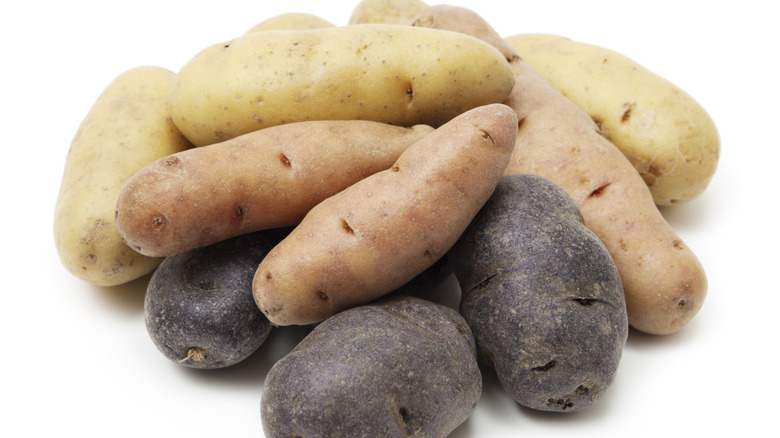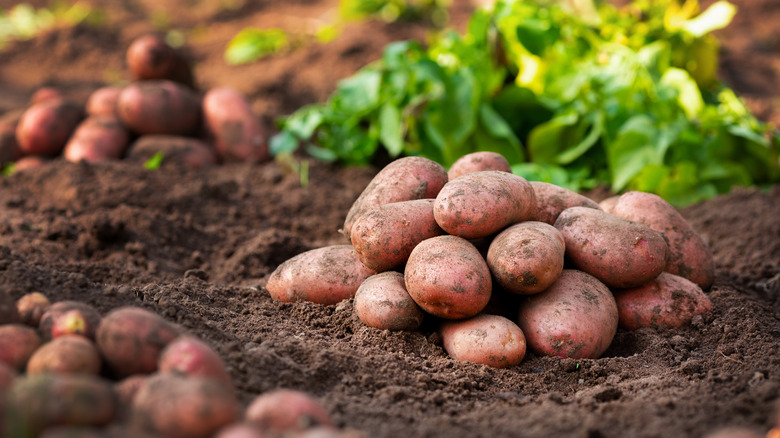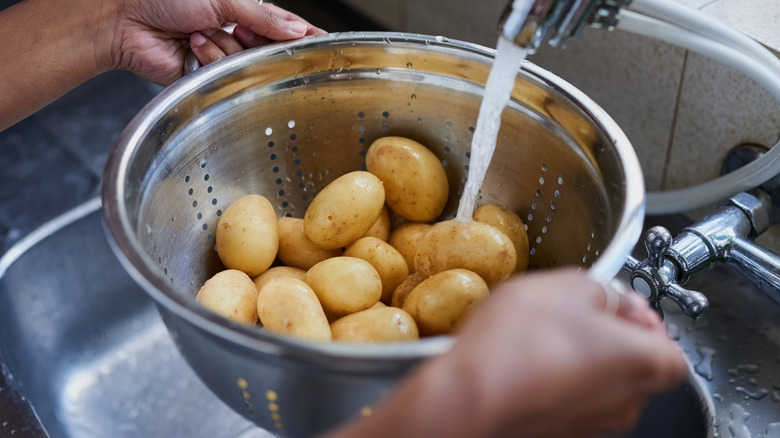The Tip You Need To Know Before Washing Waxy Potatoes
If you're in the market for a versatile vegetable, look no further than the humble potato. A single spud can handle breakfast, lunch, or dinner, and it can be mashed, fried, baked, or boiled. It can even make vodka under the right conditions. Not all potato varieties are the same, however, and as such, they need to be handled differently in the kitchen.
Waxy potatoes, for example, like red bliss, fingerlings, and new potatoes, are best for recipes like potato salad because they have thin skins and delicate flesh. In order to preserve their papery skins, you must use a gentle touch when washing them off in the sink. You might have a vegetable brush handy for scrubbing the skins of russets and other root vegetables, but when it comes to thin-skinned varieties, you don't need to do much more than rinse. If you scrub too vigorously, especially with an abrasive brush, you could rip those delicate potato skins right off.
If you have a bag of waxy potatoes to clean, all you need is your own hands and some cold running water to get the job done. Because the skins are so thin, they won't cling to any lingering dirt, and you'll be able to feel when the surfaces of the spuds are grit-free.
Potatoes always need to be washed
When farmers harvest potatoes, they often don't wash the dirt off the skin because it protects from mold and fungus and gives the potatoes a longer shelf life. When the time comes to cook them, however, you'll definitely need to give your spuds a bath, not just to remove grit, but because the dirt can contain pesticides and bacteria. Even clean-looking grocery store produce is probably dirtier than you think.
Waxy potatoes are often washed before they're bagged and sent to the grocery store, but not always. Even if it looks like your potatoes are clean, it's important to give them another quick cleaning before you use them because some dirt can linger and get stuck in the eyes. Because the skins are so thin, the dirt should wash away easily if you rinse your waxy potatoes under running water. All you need to do is run water over the potatoes and gently rub the surface with your fingertips until you no longer feel any grit.
One thing to keep in mind is that you only need to wash your potatoes when it's time to cook. If you wash them ahead of time, the moisture can encourage mold growth, unless you thoroughly dry each potato before storing them.
Vegetable brushes are too abrasive
If you buy a lot of produce from farmer's markets — or if you grow your own — it's helpful to have a vegetable scrubber handy by the sink. Potatoes with thicker, rougher skins, like russets, do need a thorough once-over with a veggie brush to wash away all the grit because the rough surface can trap hidden dirt. Additionally, russets tend to be one of the potato varieties that are most often sold dirty. Thin-skinned varieties, however, can't stand up to the prickly bristles of a vegetable scrubber. In fact, even the surface of a regular kitchen sponge can scrape away the precious skin of a red bliss potato, which negatively affects both the potato's flavor and nutrients.
If you have a bag of red bliss or fingerling potatoes to process, dump them all into a colander in the sink and gently rinse them under the faucet. You can also soak your spuds for a minute or two in a bowl of water and individually clean them by holding them under water and rubbing the surfaces with your fingertips. The dirt will sink to the bottom of the bowl, and when you're done washing the potatoes, you can just pour the dirty water away. Whatever method you choose, make sure you always handle your potatoes gently when washing them — that way, you won't lose an inch of their precious skins.


